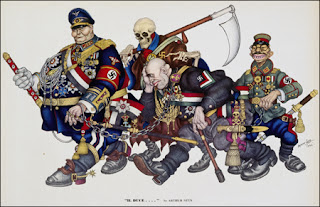
My obsessive question of how or what or why one might create in the face of evil, under the shadow of terror and knowing the blackness of our time has led me to the work of Arthur Szyk.
http://www.ushmm.org/museum/exhibit/online/szyk
http://www.newseum.org/arthurszyk/
The editorial cartoon (with all that it implies as an illustration of current social and political themes, necessarily topical) takes on more weight over time (providing that it maintains relevance) and approaches the gravity of Allegory. Szyk's work most certainly has this weight, whether it be in "The Anti-Christ" or "Satan Leads the Ball", packed as they are with a Dantean "high gossip" or the more artistically accessible "Book of Esther" or "Uriel Acosta".
I imagine that 2000 years from now, the circles of cultural literacy that contains Hitler, Stalin and Mussolini will be the same ones that, for us now, contains Caligula, Atila the Hun and Ivan the Terrible. Who will remember the particular "horror" of their lives and times? It all fades into a historical caricature, more often than not, inaccurately drawn. It is a sad truth of this immediate Media(-ted) age that so much of the hard-won wisdom of our culture slips over the horizon of understood reference at an ever increasing rate. Who has "at hand" the knowledge of those contemporaries of Dante that populate the Comedia or the layered satirical references in Swift?
The point is that the "art" (those essential core meanings) of the work endures, transcends the occasion of it creation. From where we now stand, upon the pounded earth of a new millennium, the work of an artist such as Szyk reveals, I believe, something of a "transition point" according to contemporary relevance. Although the horror of his subject has not at all become ameliorated by time (it will only be forgotten, never accepted), the beauty of his work is not as deeply overshadowed by the conditions of the moment.
As far as my own current project is concerned (acknowledging its privileged context), this relevance is extreme: if, as George Steiner remarks in Bluebeard's Castle, "in locating Hell above ground, we have passed out of the major order and symmetries of Western Civilization", then the artistic imperative (I stress: for me) is to use Hell's language - be this literal or visual - to indicate a "way out" through the transcendent qualities of Beauty.
Beauty, whether it be in Hell (Bosch) or Heaven (Michelangelo), burns with the same quickening Pulse within us. That I choose to hold high the Beauty of the Skull over the Beauty of the Rose is not indicative of an inner cynicism or pessimism with regard to human "Being," rather it is the hard and relentless understanding that without the dream of Heaven (read: beauty), Hell has no power over the human spirit.
